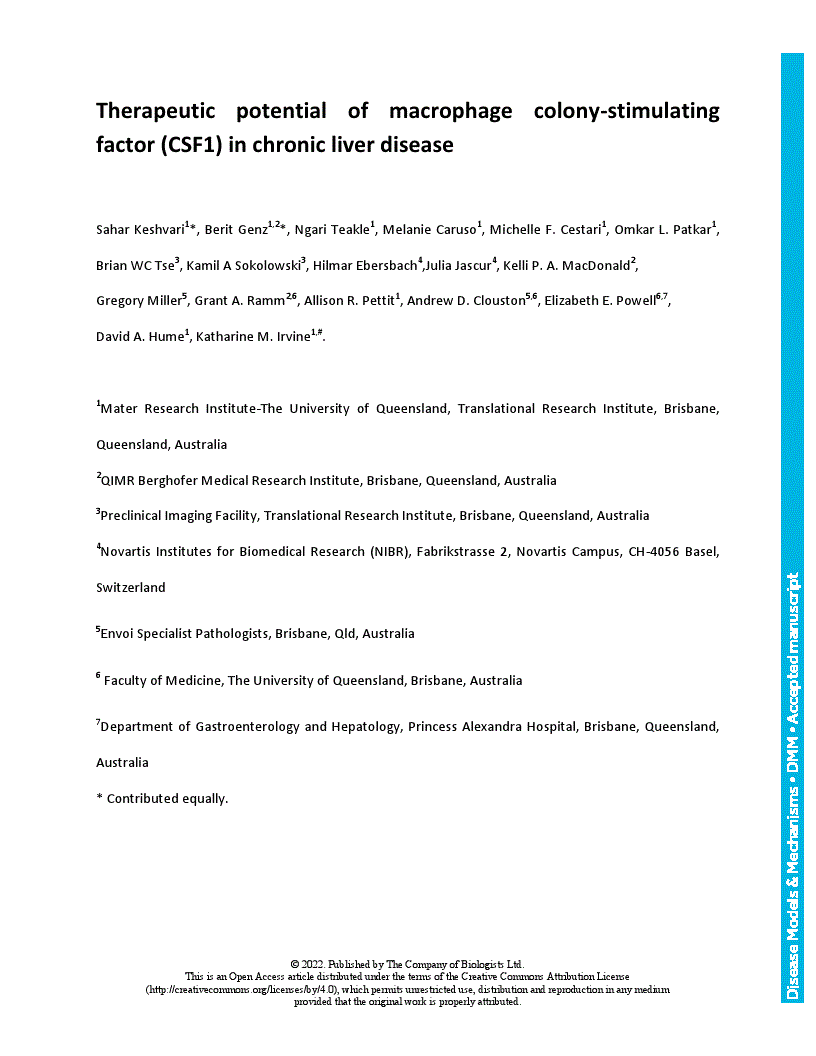Resident and recruited macrophages control the development and proliferation of the liver. We showed previously in multiple species that treatment with a macrophage colony stimulating factor (CSF1)-Fc fusion protein initiated hepatocyte proliferation and promoted repair in models of acute hepatic injury in mice. Here we investigated the impact of CSF1-Fc on resolution of advanced fibrosis and liver regeneration, utilizing a non-resolving toxin-induced model of chronic liver injury and fibrosis in C57BL/6J mice. Co-administration of CSF1-Fc with exposure to thioacetamide (TAA) exacerbated inflammation consistent with monocyte contributions to initiation of pathology. After removal of TAA, either acute or chronic CSF1-Fc treatment promoted liver growth, prevented progression and promoted resolution of fibrosis. Acute CSF1-Fc treatment was also anti-fibrotic and pro-regenerative in a model of partial hepatectomy in mice with established fibrosis. The beneficial impacts of CSF1-Fc treatment were associated with monocyte-macrophage recruitment and increased expression of remodeling enzymes and growth factors. These studies indicate that CSF1-dependent macrophages contribute to both initiation and resolution of fibrotic injury and that CSF1-Fc has therapeutic potential in human liver disease.
Therapeutic potential of macrophage colony-stimulating factor (CSF1) in chronic liver disease
Authors who contributed equally to the work.
- Award Group:
- Funder(s): National Health and Medical Research Council
- Award Id(s): APP1162171
- Funder(s):
Currently Viewing Accepted Manuscript - Newer Version Available
- Split-screen
- Views Icon Views
- Open the PDF for in another window
-
Article Versions Icon
Versions
- Version of Record 19 April 2022
- Accepted Manuscript 16 February 2022
- Share Icon Share
-
Tools Icon
Tools
- Search Site
Sahar Keshvari, Berit Genz, Ngari Teakle, Melanie Caruso, Michelle F. Cestari, Omkar L. Patkar, Brian W. C. Tse, Kamil A. Sokolowski, Hilmar Ebersbach, Julia Jascur, Kelli P. A. MacDonald, Gregory Miller, Grant A. Ramm, Allison R. Pettit, Andrew D. Clouston, Elizabeth E. Powell, David A. Hume, Katharine M. Irvine; Therapeutic potential of macrophage colony-stimulating factor (CSF1) in chronic liver disease. Dis Model Mech 2022; dmm.049387. doi: https://doi.org/10.1242/dmm.049387
Download citation file:
Advertisement
Sex matters in preclinical research

DMM calls for improved inclusion, analysis and reporting of sex as a biological variable in preclinical animal modelling research. Read the full Editorial by Monica J. Justice.
Subject collection: Building advocacy into research

DMM’s new series - Building advocacy into research - features interviews, ‘The Patient’s Voice’, with patients and advocates for a range of disease types, with the aim of supporting the highest quality research for the benefit of all patients affected by disease.
Travelling Fellowships for early-career researchers

DMM and its sister journals offer Travelling Fellowships of up to £3,000 to graduate students and post-doctoral researchers wishing to make collaborative visits to other laboratories. Find out more about our Travelling Fellowships and read stories from previous grant recipients.
Read & Publish Open Access publishing: what authors say

We have had great feedback from authors who have benefitted from our Read & Publish agreement with their institution and have been able to publish Open Access with us without paying an APC. Read what they had to say.
The Forest of Biologists
Our Publisher Claire Moulton recently visited the two Woodland Trust UK sites where we are planting new native trees for published Research and Review papers and protecting ancient woodland on behalf of our peer reviewers.
Other journals from
The Company of Biologists



